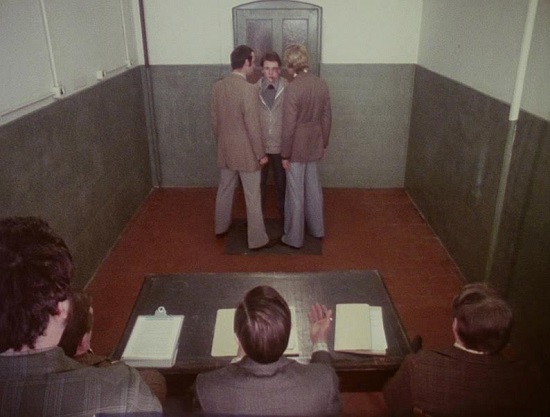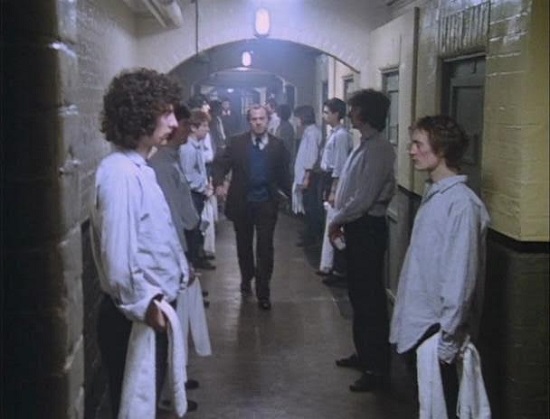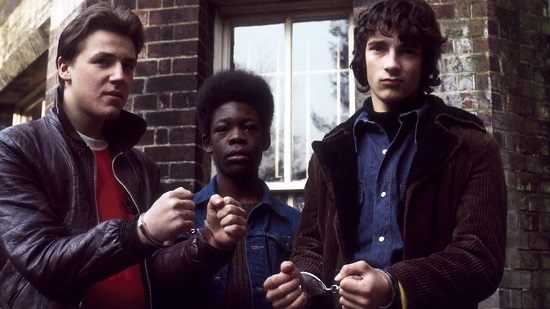It’s difficult to conceive today of a piece of television drama being deemed so controversial as to be banned. Such is the relaxation in what is acceptable in being shown, in particular regards to sex and violence, and with a very clear and gradual depoliticisation of British drama especially, learning about the banning and censorship of a program because of its political content is a surreal feeling. In 1977, the BBC did just that and brought a halt to the broadcast of a dramatic play which, even after several attempts to compromise in the edit, failed to be broadcast thanks to managing director, Alasdair Milne, and controller of BBC 1, Bill Cotton. That film is Alan Clarke’s direction of Roy Minton’s Scum for the Play For Today slot and it would not be seen in this form until a rerun in the 1990s for a season of Clarke’s work after his early death from cancer. Such an event in the history of the BBC still presents a lot that can learned about popular media in Britain and how, even when overtly devised with clear thought and made with skill and merit, the questioning of institutionalisation, establishment systems and class will always run into trouble with the powers that be. Especially when, as in Scum’s case, it uses the techniques of conveyance usually devised by propaganda of the right but for more liberal purposes.
Scum charts the day-to-day life in a British borstal. It follows the allegiance between some of the more violent inmates and the warders who have a financial and behavioural pact for keeping order and making money on the side. This becomes disrupted when an incredibly violent but smart inmate joins the borstal, Carlin (an early television role for newcomer, Ray Winstone), who takes over the system and becomes the “daddy” of the borstal. This is shown alongside the treatment of several other inmates who are not so able to look after themselves in the brutal institution, including Angel (Davidson Knight) who suffers a variety of horrific racial abuse, Archer (David Threlfall) who rebels through more intellectual protests against the screws, and Davis (Martin Phillips) who suffers mental and physical assaults until his gang rape in a potting shed leads to his eventual suicide. Scum essentially questions the effectiveness of the borstal system and raises further questions about the general morality of imprisonment, punishment and rehabilitation as a whole. Yet it does all of this by presenting a dramatised play as a factual document; a raw, almost documentary-like collection of true-to-life stories from genuine borstal life.
It should be stated that the 1977 Play For Today slot was already brimming with provocative dramas, often dealing with class divisions and fall out. The same yearly series that Scum was due to be part of also contained Ken Loach’s two-part play, The Price Of Coal – a perfect middle finger to the hypocrisies of the silver jubilee – Mike Leigh’s Abigail’s Party and John Goldschmidt’s direction of Jack Rosenthal’s’ Spend, Spend, Spend. In other words, the BBC was delivering a constant wealth of questioning of all aspects of British society and the relative failures and contradictions that were, and still are, present. Scum fits into this mould and, with Margaret Matheson as the slot’s producer, it sits comfortably alongside these plays, albeit at a far more violent and visceral level. So, with this in mind, what does its censorship tell about such questioning, both then and now? In an era when television drama has been dramatically reduced and simplified, plays such as Scum recall an era when the production end of the BBC were willing to push boundaries but also a time when its upper echelons were unable to keep up. Matheson especially believed in the play, and defied Milne and Cotton by smuggling it out for a private screening for journalists in Soho, some months after its ban in 1978, leading to certain members of the press championing the film and questioning the decision. Peter Fiddick of The Guardian even went on Tonight to debate the play’s merits with Milne who refused to accept that the play could be broadcast.

The real essence of Scum’s banning derives from the combination of two aspects. The first is that its general violence and portrayal of borstal life was deemed too sensational, with its many stories, whilst being all based on true events, said to have happened at a number of different borstals rather than just one. Mixing with this is the way Clarke shoots the drama, which is perhaps the most prescient element to discuss in the context of today’s political climate. For, like a number of filmmakers, Clarke used a number of aesthetics and filming techniques to blur the line of what was being seen. Accepted by both those who had banned it and by those who had argued its merits, Clarke’s direction (alongside Minton’s interview research with genuine borstal boys) does frame the drama like a documentary. Many dramas at the BBC had used such a technique in work that addressed more social issues. In Ken Loach’s Wednesday Play, Cathy Come Home (1966), the technique is used to great effect in order to present its argument that the housing system then was unfit and dysfunctional, whilst the same technique was used by Peter Watkins to add a sense of questioning to both presentations of the past (in Culloden) and the future (in The War Game). In other words, Clarke’s use of the technique – that of shaky cameras, raw performances, low-key editing and no musical score – was certainly not a new thing by 1977 for the BBC.
Clarke and Minton worked around the ban, remaking the film as a full blown feature film two years later. Though much was kept the same, subtle differences meant that the film lost some of its political edge; the violence became gratuitous rather than true-to-life, the shooting was smoother and looked more like a Stanley Kubrick film than the raw documentary aesthetic achieved in the original BBC version. The cast look and act more dogged, and it’s hard not to blame them considering the atmosphere that was undoubtedly lived through for the filming shoot twice over. Yet the power in Minton’s writing still managed to get under the establishment’s skin and, after a broadcast of this version on Channel 4 in 1983, no less than Mary Whitehouse herself took the IBA (International Broadcasting Association) to court for daring to broadcast it. She eventually lost the lawsuit and was left with an enormous legal bill, later supposedly paid by an unnamed donor; the establishment always looking after their own.

In essence the documentary technique of the original is more at home with right-wing agendas in terms of modern British politics. The notion of “fake news” and its destabilising effects, created through the aesthetic presentation of misinformation, is arguably very similar but the shift in the politics behind such an idea is startling considering Scum is still only forty years old. Yet the political shift of a mere forty years means that such an idea is no longer used to highlight the harsh and brutal faults in the housing and borstal systems of this country, but instead used to aid what can only be described as a fascistic agenda and paranoia, in particular through online media. It is even more telling that using such a questioning of genuine social problems ran into trouble even then; this was an era that was equally preparing for the pressure and tensions building towards the decade or so of Thatcherism to come. The BBC, however, would rarely back down again in such a way, at least in its drama output which remained strikingly visceral throughout Thatcher’s government. Revisiting Scum and celebrating its original broadcast version reminds not only of when television was more daring but ultimately of how effective the blurring mechanisms that artists such as Clarke used were in dismantling ambivalence towards the abuse of power in Britain and in its institutions. His is a voice that is greatly missed still because of this. If anything, however, it highlights further our need to be just as questioning in how we deal with the presentation of facts and information today; the techniques once used to question the establishment now being the very means with which it defends itself.
Check back next week for poet Adelle Stripe’s re-appreciation of Alan Clarke’s Rita, Sue and Bob Too.


